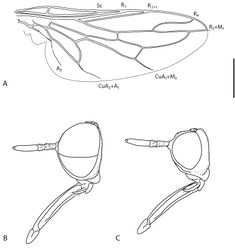Iranotrichia
| Notice: | This page is derived from the original publication listed below, whose author(s) should always be credited. Further contributors may edit and improve the content of this page and, consequently, need to be credited as well (see page history). Any assessment of factual correctness requires a careful review of the original article as well as of subsequent contributions.
If you are uncertain whether your planned contribution is correct or not, we suggest that you use the associated discussion page instead of editing the page directly. This page should be cited as follows (rationale):
Citation formats to copy and paste
BibTeX: @article{Winterton2011ZooKeys138, RIS/ Endnote: TY - JOUR Wikipedia/ Citizendium: <ref name="Winterton2011ZooKeys138">{{Citation See also the citation download page at the journal. |
Ordo: Araneae
Familia: Dictynidae
Name
Iranotrichia Winterton & Gharali, 2011 gen. n. – Wikispecies link – ZooBank link – Pensoft Profile
Type species:
Iranotrichia insolita sp. n.
Diagnosis
Body length: 4.0–5.5 mm [male], 4.5–5.0 mm [female]. Head higher than long, sub-spherical, female with broad, raised postocular ridge; antenna elongate, cylindrical, length 0.6–1.2× head length; antennal style subterminal, flagellum broadly rounded to truncate apically, not notched; frons relatively flat, not protruding anteriorly; mouthparts greater than head length, projecting anteriorly; scutum with dense pile of semi-appressed, silver-white lanceolate setae, all directed towards a single posteromedial point (Figs 2–3, 6); wing vein M1 joining with R5 (Fig. 1A), cell r5 petiolate to wing margin; wing vein M2 absent; costal margin ending at vein R5; abdomen broad, width equal to thorax; tergite 2 sensory setae well defined and two circular patches. Male genitalia: rotated 180°; tergite 7 and sternite 7 broad and separate, not ring-like; male epandrium split medially as two sclerites, halves sub-circular or sub-triangular;epandrium not covering gonocoxites ventrally; hypandrium as, paired sclerites, narrow paddle-shape with short setae along posterior margin; gonostylus well developed, irregular shaped, dark sclerotized and irregular spinose marginally; aedeagus protruding anteriorly from epandrium only a relatively short distance; gonocoxite irregularly shaped and mostly reduced; gonocoxal apodeme relatively thickened, broadly triangular with medial braces joining with aedeagus; aedeagus with lateral aedeagal bulb present, sometimes well developed; distiphallus bifid, recurved dorsally at base then greatly elongate and coiled. Female genitalia: tergite 9+10 narrow and band-like, acanthophorite spines absent; sternite 8 slightly longer than tergite 8, broadly acuminate posteriorly; furca a dark-sclerotized ring with narrow posterolateral arm, connected posteromedially with ‘Y’-shaped sclerotized bridge between furca and anterior margins of tergite 9+10; two sclerotized spherical spermathecae; spermathecal sac simple, connected to bursa medially immediately anterior to spermathecal ducts.
Etymology
The genus name is derived from the type location of members of this genus; Iran, -trichia (Greek: hair), referring to the setal pattern and has frequently been used historically to formulate to scenopinid generic names.
Included species. Iranotrichia insolita sp. n., Iranotrichia nigra sp. n.
Comments
This genus is placed in Scenopininae based on the rotated genitalia, wing venation and shape of the tergite two setal patches. The general habitus of members of this new genus is very reminiscent of certain genera of Bombyliidae. Iranotrichia gen. n. is morphologically very similar to Metatrichia and Pseudomphrale, but can be separated from these and other Scenopinidae based on the greatly elongate and often coiled bifid distiphallus, elongate antennae and mouthparts, flagellum not notched apically and with style subapical on outer surface. The elongate antennae and mouthparts and distiphallus are characteristic of Iranotrichia; although such elongation of these structures is sometimes found in proratine genera such as Prorates and Jackhallia, it is not found elsewhere in Scenopininae. Some species of Pseudomphrale and Metatrichia have elongated mouthparts (e.g. Metatrichia palaestinensis (Kröber, 1937), Metatrichia freidbergi Krivoshiena and Krivosheina, 1999, and Pseudomphrale longirostris Becker, 1913) (Krivosheina and Krivosheina 1999[1]; Kelsey 1969[2]) about half as long as species of Iranotrichia gen. n. Possibly of little phylogenetic significance, but useful for differentiating Pseudomphrale from Iranotrichia gen. n. and Metatrichia is that all specimens of Pseudomphrale species are between 1.6 and 4.0 mm body length, while specimens of Iranotrichia and Metatrichia are rarely less than 4.0 mm (Kelsey 1969[2]; Krivosheina and Krivosheina 1996[3], 1999[1]; Winterton and Woodley 2009[4]). A greatly elongate, coiled distiphallus is also present in Metatrichia palaestinensis (cf. Kröber 1937[5] and Kelsey 1969[2]). Both species of Iranotrichia gen. n. are known only from a single collecting event in Ghazvin province, Iran where Iranotrichia insolita sp. n. is apparently far more abundant than Iranotrichia nigra sp. n.
Key to Iranotrichia gen. n
Original Description
- Winterton, S; Gharali, B; 2011: Iranotrichia gen. n., a new genus of Scenopinidae (Diptera) from Iran, with a key to window fly genera of the world ZooKeys, 138: 75-92. doi
Other References
- ↑ 1.0 1.1 Krivosheina N, Krivosheina M (1999) New data on Palaearctic species of the genus Metatrichia (Diptera: Scenopinidae). Zoologicheskii Zhurnal 78: 849-859.
- ↑ 2.0 2.1 2.2 Kelsey L (1969) A revision of the Scenopinidae (Diptera) of the world. Bulletin of the United States National Museum 277: 1–336. http://www.biodiversitylibrary.org:item:33185
- ↑ Krivosheina N, Krivosheina M (1996) Description of the type specimens of dipterans of the genus Pseudomphrale Kröber (Diptera, Scenopinidae). Entomological Obozrenie 75: 455–462. [Russian; English translation in Entomological Review (1996) 76 (4), 494–498].
- ↑ Winterton S, Woodley N (2009) New species of Metatrichia Coquillett (Diptera: Scenopinidae) from Australia and Venezuela. Zootaxa 2094: 42–51. http://www.mapress.com/zootaxa/2009/f/zt02094p051.pdf
- ↑ Kröber O (1937) Ein Beitrag zur Kenntnis der Omphraliden (Scenopinidae), Diptera. Stettiner Entomologische Zeitung 98: 211-231.
Images
|

![Figure 2. Iranotrichia insolita sp. n.: A. male, dorsal view [Morphbank 693172]; B, same, anterolateral view [Morphbank 693173]. Body length = 4.0 mm.](/w/media/thumb/1/1f/ZooKeys-138-075-g002.jpg/175px-ZooKeys-138-075-g002.jpg)
![Figure 6. Iranotrichia nigra sp. n.: A male, dorsal view [Morphbank 693176] B same, lateral view [Morphbank 693177]. Body length = 4.5 mm.](/w/media/thumb/0/0f/ZooKeys-138-075-g006.jpg/149px-ZooKeys-138-075-g006.jpg)